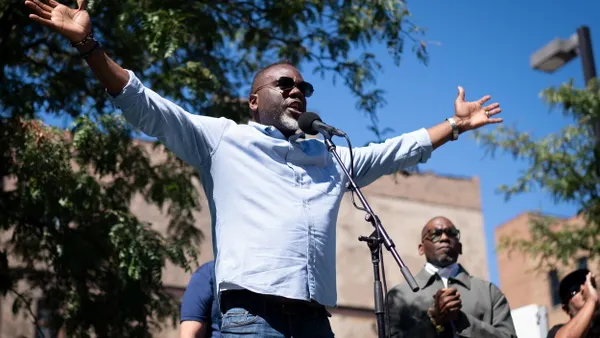Dive Brief:
- The U.S. Conference of Mayors (USCM) Working Group on Police Reform and Racial Justice shared a statement of principles last week to "address racially-biased practices" in policing, calling for increased transparency, trust, equality and respect for the sanctity of life.
- The principles — based on those espoused by Sir Robert Peel when he founded the first full-time police force in 19th century London — called for a "reset" and redefinition of the role police play in the communities they protect. The group said police departments should focus on "respectful, constitutional engagement" with their communities, including through diversifying hiring practices.
- The working group also called to rethink officers' use of force, and said police must not vary their conduct on account of race, religion, gender or other discriminatory factors. The group's initial principles will be followed by a full set of national recommendations in the coming weeks to "reassure our communities that there is a concrete path forward for the future."
Dive Insight:
USCM's working group formed in the wake of George Floyd's death by a Minneapolis police officer, with the principles quickly coming together as widespread protests against racial and social injustice continue. Those protests have already forced policy changes and discussions in some cities about what police reform could look like.
The group is led by Chicago Mayor Lori Lightfoot, chair of USCM’s Criminal and Social Justice Standing Committee, who said it is a matter of urgency that policing and equity be addressed quickly at the local level. "There is no can to kick down the road," she said during a committee session at the conference's annual meeting.
Charles Ramsey, a former Philadelphia Police Commissioner and Washington, DC Police Chief who serves as an advisor to USCM, said at the meeting that it seems the whole country has been "galvanized to take a serious look at policing and the role of policing in our country."
The working group's recommendations borrow heavily from Peel, the man regarded as the father of the modern British police. Tampa, FL Mayor Jane Castor, a member of the working group, said looking to practices of the past can be helpful, as these new principles are an 21st century adaptation of Peel's Nine Principles.
"A lot of the answers to policing, we have had in place for some time, but there was difficulty in implementing those on a continuous and equal basis," Castor said during the meeting.
Columbia, SC Police Chief William Holbrook, a member of the working group, said while many police departments nationwide are "forward-leaning" in their approach to policing, it will be crucial to change the culture around law enforcement, not just policy.
"I think this document is an opportunity for us to create that rising tide to raise all ships, which would be the 18,000 police departments across this country and create true actionable items that each city can reach out and champion and put into play," Holbrook said during the meeting.
Legislative action on policing has been floated at the federal level, with the U.S. House of Representatives passing a bill largely on party lines, while a proposal from Republicans in the U.S. Senate was blocked by Democrats. Ramsey said Congress is unlikely to enact sweeping changes through legislation, so it is up to the more localized levels of government to step up and do their part if they want to see change.
"Policing is done at the local level, the majority of policing, anyway," Ramsey said. "We're not going to find a solution at the federal level. It's the mayors, it's the governors, it's those people who really understand the needs of the community that will get this done."










